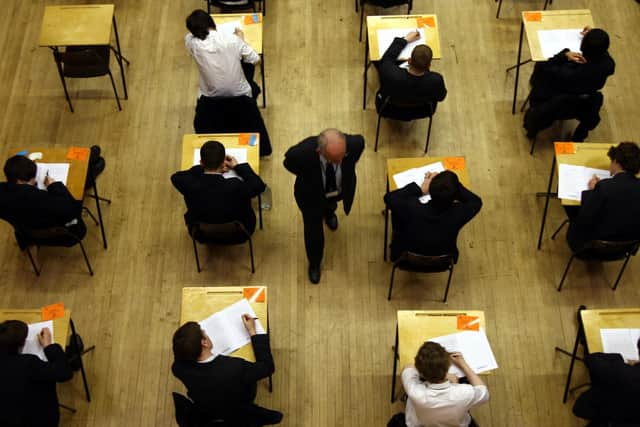Secondary school pupils face staggered return to classroom after Christmas to 'reduce Covid spread and help with mass testing plan'
and live on Freeview channel 276
Those in Year 11 and 13 - studying for their GCSE and A Levels respectively - will be expected back as soon as schools open on January 4 or 5.
But the rest will learn from home until they return up to several days later, with schools contacting parents with specific dates.
Primary school youngsters will go back to class as normal.


Advertisement
Hide AdAdvertisement
Hide AdSchools minister Nick Gibb said the coronavirus tests will be given by volunteers and agency staff, with details expected to be published this week, though education unions and professional associations warned that testing in secondary schools will not be ready at the start of January due to the Government’s last-minute announcement of the scheme at the end of term.
Labour said the reopening of schools should not be delayed any more than necessary, as teachers remain “determined” to get pupils safely back in the classroom.
Term has now ended for schools in England until January and they will not be forced to remain shut in the new year, even in Tier 4 areas where coronavirus restrictions are toughest.
Health Secretary Matt Hancock refused to confirm that schools in Tier 4 areas would reopen in January if cases continue to rise.
Advertisement
Hide AdAdvertisement
Hide Ad“The Education Secretary [Gavin Williamson] has set out the plans for schools in January and because of testing and because we know the tests work on this new variant, we’ve got plans to keep the schools open that are essential in a way, that can stop them from transmitting the virus by using very extensive testing in schools,” he said.
More than a dozen local schools have been forced to send children and staff into isolation following confirmed Covid cases, with at least two closing completely.
The majority of youngsters were off school, learning from home, from March until the end of the summer term.
They returned to the classroom in September.
Sean Bullen, education chief at the Fylde Coast Academy Trust, which runs a number of schools across the Fylde coast, said the Government announced its plans at 1pm last Thursday, the same day youngsters broke up for the festive break.
Advertisement
Hide AdAdvertisement
Hide AdIn a letter to parents, he said: "The Government has made these decisions for two reasons.
"The first is to help control the spread of the virus.
"The second, which is not as yet a certainty, is to help schools plan for more regular testing of students and staff.
"If that does happen, we will clearly communicate thoroughly about that in the New Year.
Mr Bullen added: "We would like to once again apologise for the late notice of this announcement.
Advertisement
Hide AdAdvertisement
Hide Ad"However, we are responding to Government directives as operationally, practically, as as our schools' capacity allows in the current climate."
Mass testing was trialled at Moor Park Primary School in Bispham, which suffered an outbreak earlier in the pandemic and had a support worker, Cath Strangwood, 57, die after contracting the virus, this month.
Some pupils in Year Four were then sent home after a confirmed case.
It is thanks to our loyal readers that we can continue to provide the trusted news, analysis and insight that matters to you. For unlimited access to our unrivalled local reporting, you can take out a subscription here and help support the work of our dedicated team of reporters.
Comment Guidelines
National World encourages reader discussion on our stories. User feedback, insights and back-and-forth exchanges add a rich layer of context to reporting. Please review our Community Guidelines before commenting.